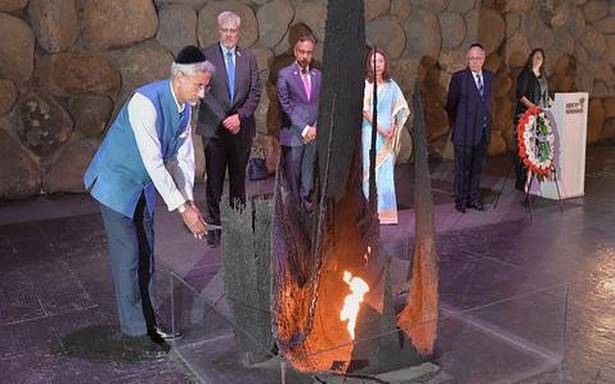The quadrilateral followed the External Affairs Minister’s bilateral meeting with Israeli Alternate Prime Minister and Foreign Minister Yair Lapid.
In Israel for a five-day visit, External Affairs Minister S. Jaishankar took part in a quadrilateral grouping, including Foreign Ministers of Israel, United Arab Emirates and the United States on Monday. The quadrilateral, which followed his bilateral meeting with Israeli Alternate Prime Minister and Foreign Minister Yair Lapid, is a new grouping that builds on ongoing cooperation between the U.S.-Israel-UAE after the Abraham Accords last year that saw UAE and Israel establish diplomatic ties, and the India-Israel-UAE cooperation that has been launched since then.
Also read: India and the Abraham Accords
A fruitful first meeting with Mr. Lapid, UAE Foreign Minister Sheikh Abdullah Bin Zayed and U.S. Secretary of State Antony Blinken ‘discussed working together more closely on economic growth and global issues. Agreed on expeditious follow-up.’ In an interesting aside, Mr. Jaishankar’s travel to Israel is also routed via the UAE, on flights that started as a consequence of the Abraham Accords and the opening of diplomatic missions and flights between them.
A U.S. government spokesperson said the Foreign Ministers discussed “future opportunities for collaboration in the region and globally.”
“The Secretary and the Foreign Ministers discussed expanding economic and political cooperation in the Middle East and Asia, including through trade, combating climate change, energy cooperation, and increasing maritime security. Secretary Blinken and the Ministers also discussed people to people ties in technology and science, and how to support global public health in relation to the COVID-19 pandemic,” said U.S. State Department spokesperson after the meeting, that lasted over an hour, ended late on Monday evening.
Foreign Ministers of the U.S., Israel and UAE had met in Washington on October 13 to discuss modalities of trilateral cooperation, and set up two working groups: on religious coexistence and the other on water and energy.
Business groups in India, UAE and Israel have been in talks for trilateral cooperation since diplomatic ties had opened, and the International Federation of Indo-Israel Chambers of Commerce (IFIIC) has predicted that the potential for agreements backed by Israeli innovation, UAE funding and Indian manufacturing, given India’s close ties and strategic partnership with the two other countries could cross $100 billion by 2030. In the first such venture, a UAE project for robotic solar (panel) cleaning technology was signed by Israeli company Ecoppia that has a manufacturing base in India.
Significantly, neither the quadrilateral meeting, nor the trilateral meeting discussed the issue of Palestine and resuming the “Middle east peace process”, although the Joe Biden administration has expressed support for a “two-state solution”, that is in line with India’s broader position.
On Monday, Mr. Jaishankar and Mr. Lapid held bilateral talks, agreeing to resume long-pending negotiations for a free trade agreement, a mutual recognition agreement for COVID-19 vaccine certificates, beginning with Israeli acceptance of Indian travellers vaccinated with Covishield, and Israel’s joining the International Solar Alliance.
Source: Read Full Article

